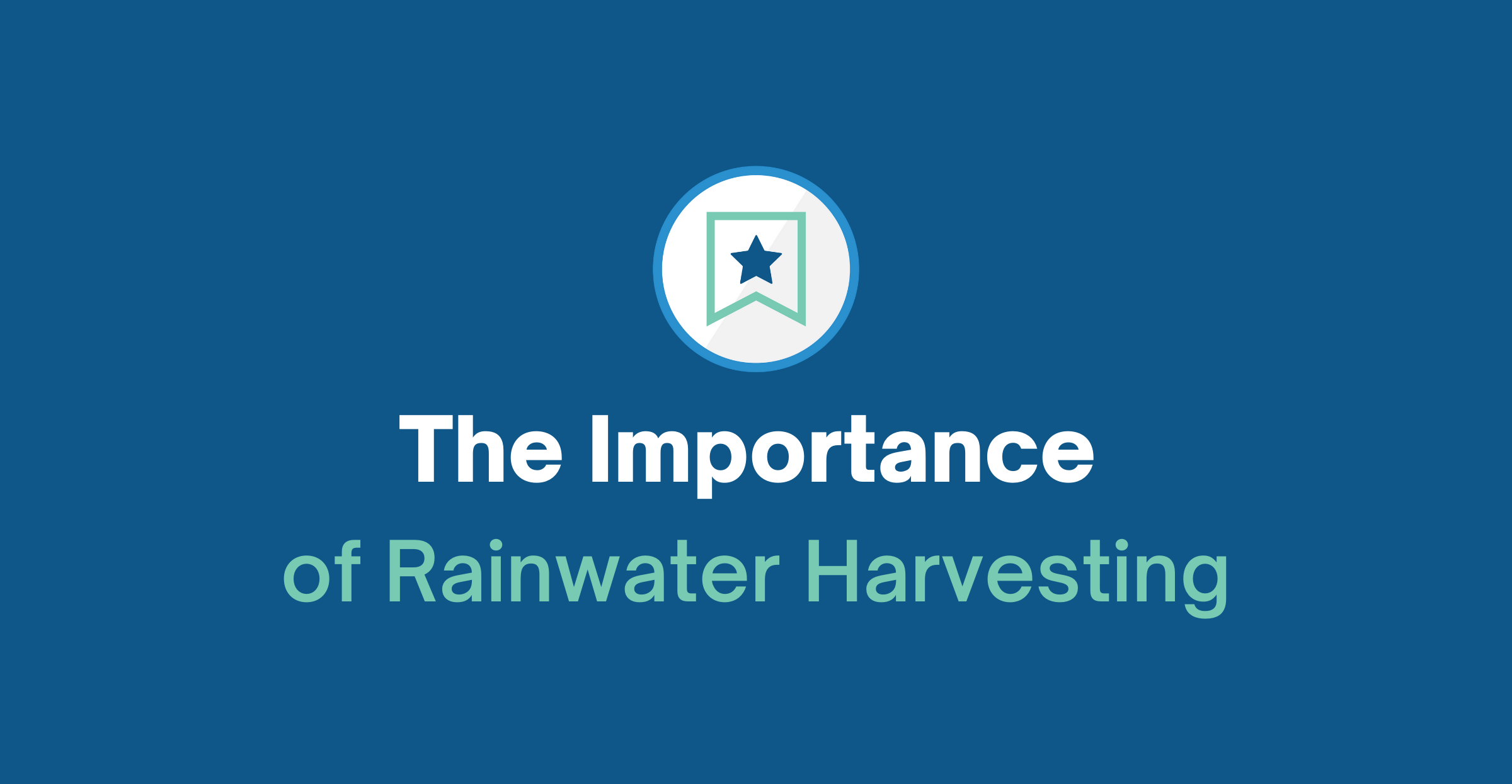The Importance of Rainwater Harvesting

As the public perception of how we use our resources continues to change, people are always looking for ways to be more self-sustainable. Some see it as necessary as droughts become more common, and burden is put on traditional municipal systems, while others just want to do their part to be more eco-friendly.
One way that people ensure that they have potable water for everyday use is by collecting rainwater through rainwater harvesting. Emergencies are not the only reason to have rainwater reservoirs on hand, as you will come to find out there are plenty of reasons to start collecting rainwater now.
What is Rainwater Harvesting?
Rainwater harvesting is a technique that has been used for centuries to capture and hold rainwater as a form of potable water.
While it used to be (and still is in smaller operations) caught in small rain barrels, technology has improved, and rain is often caught and stored in high-capacity storage tanks.
It should be noted that rainwater harvesting differs slightly from stormwater harvesting as it is always collected from the roof and not a ground surface. Once collected and purified, this rain can be used in everything that you would use city water for, including drinking, bathing, and cleaning.
How Does It Work?
The process of rainwater harvesting is not technical, but it is fascinating. It is a multistep process that starts with the rainfall on your roof.
From the roof, the water drains down the gutters and into the downspout. The water continues to the underground storage containers, passing through the first round of filtration, which filters out any large debris like leaves before it gets to the storage vessels.
When the water is needed, it first passes through a series of filters, including a sediment and carbon filter that clears out any small debris and organic material, then it is treated with a UV light to kill any bacteria in the water.
Pure and naturally soft water is then pumped through the house to be used wherever and whenever needed.
What is the of Importance of Rainwater Harvesting?
There are multiple benefits of rainwater harvesting for the individual, municipalities, and the earth. These are just a few examples of how harvesting rainwater is beneficial for all parties involved.
1. Reduces the strain on local water utilities
Traditionally, households get their water from a well or the city, but both have finite amounts of water, and the city has a whole population to serve. Usually, the city has plenty of water due to its own collection and water recycling plants, but in times of extreme drought, even the city can see its water supply running out.
If you can tap your own water reserves, it will reduce some of the strain on the city's supply and give them a little more to work with.
Imagine if enough people did this, there would probably never be a water shortage again.
2. Reduces the strain on the natural water supply
Rainwater harvesting doesn't just help the city's water reservoirs; it also keeps water where it should be in nature.
Instead of stormwater harvesting taking water from lakes and streams that are likely to fight their own battle against drought, it collects and consolidates water that would likely evaporate again before it ever makes it to a river or lake.
3. Provides a self-sustainable water source
One of the most important aspects of rainwater harvesting is that it provides a self-sustainable water source.
While some people will use this system as an emergency backup, for others, it is their only source of water. In the case of a sustained ecological emergency where municipalities simply can't provide water anymore, people who own these systems will be some of the few that have a potable water source at their disposal.
Being off the grid also means that you will never have a water bill and will never be subject to city regulations regarding watering your plants. On the flip side, if preferred, you can add an automatic switchover valve that switches to another water supply.
4. Reduces stormwater headaches
Rainwater can be stored and used for irrigation and potable reasons, whereas stormwater has many regulations and headaches to get around.
One of the biggest headaches is costly water retention methods and the requirement to keep a certain water level in them. Retention ponds not only cost more, but they don't offer much in value - they also invite mosquitos, which is a whole other problem.
The other option is permeable pavers which are easier to blend in with the property but also come at a high cost and don't add much to the property.
5. Do things your way
It all boils down to the freedom that you get from harvesting rainwater.
You finally have options for doing things your way, and you don't have to answer to anyone, share with anyone, and most importantly, pay anyone for the water you use.
Usually, something like this would sound too good to be true, and there would have to be a tradeoff somewhere, but in many ways, rainwater is better because it doesn't have any chemicals added to it, and the filtration process makes it clear and even purer than traditional city water.
No Better Time
The world is an uncertain place, and there is no better time than now to ensure that your family is water-secure. You can be confident that the water you are getting is just as safe, if not safer, than the water that you would get from a municipality or well. No matter your reasons for wanting to harvest rainwater, you will surely find other additional benefits the longer you have your rainwater retention system.
If you have more questions about rainwater harvesting and the installation process or are ready to get started, don't hesitate to contact us today so we can help.
Ready to Take Control of Your Water Supply?
Don’t wait for water shortages or unreliable sources to disrupt your life. With our Rainwater Harvesting systems, you can enjoy a sustainable, reliable, and completely self-sufficient water solution tailored to your home’s needs.

